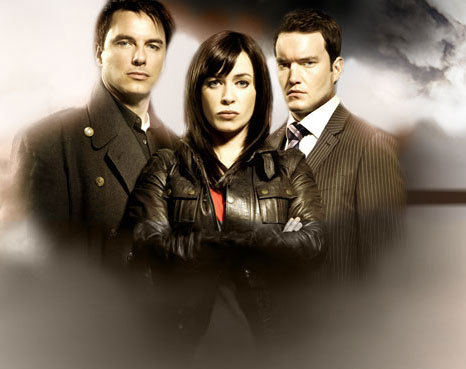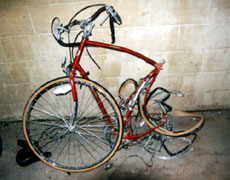 Writer, artist and animator John Ryan, creator of Captain Pugwash and Mary, Mungo and Midge, has died in hospital in Rye, East Sussex, aged 88.
Writer, artist and animator John Ryan, creator of Captain Pugwash and Mary, Mungo and Midge, has died in hospital in Rye, East Sussex, aged 88.http://news.bbc.co.uk/1/hi/entertainment/8166946.stm
Obituary in Daily Telegraph
 Writer, artist and animator John Ryan, creator of Captain Pugwash and Mary, Mungo and Midge, has died in hospital in Rye, East Sussex, aged 88.
Writer, artist and animator John Ryan, creator of Captain Pugwash and Mary, Mungo and Midge, has died in hospital in Rye, East Sussex, aged 88.
I've not watched The Bill for a while now. The last I remember, Tucker Jenkins/Mark Fowler had turned up and was trying to get off with his mum – or something. Anyway, I guess I'm exactly the sort of viewer the producers are looking to lure back with their reinvention of the show as a gritty post-watershed weekly drama.
However, the new filmy look – starting with two of Sun Hill's finest cruising the mean streets of East London, Taxi Driver-style – takes a bit of adjusting to, as if your Uncle Derek suddenly started wearing a white Saturday Night Fever suit and talking in a Brooklyn accent.
Anyway, while out on patrol, Sergeant Stone (Sam Callis) and PC Gayle (Micah Balfour) find a badly beaten teenager. As CID turn up and the investigation starts, a suspicious-looking youth, Ollie Readshaw (Jazz Litott), panics and runs away. The chase ends badly when Ollie runs in front of a lorry and is killed.
Ollie's behaviour makes him the key suspect for the brutal assault, and DI Neil Manson (Andrew Lancel) has to gain the trust of the dead boy's grieving semi-alcoholic mother to get closer to the truth. Meanwhile, family liaison officer DC Jacob Banks (Patrick Robinson) senses that the victim's young brother knows more about the attack than he is letting on.
After the stylish opening, the show becomes a bit pedestrian, with a lot of people sitting around in rooms telling each other stuff. It doesn't help that the cast don't have much charisma, either (although Julia Ford, seen recently as vengeful nurse Maureen in Shameless, steals the show as Debbie, Ollie's angry but fragile mother).
Despite the revamp, the show still seems quite worthy. It plays more like the BBC's daytime drama Doctors than the "darker, grittier and more hard-hitting" show its creators were promising. It's hard to see how even the new Bill is going to distinguish itself from perkier newcomers like Law and Order: UK, never mind heavyweight imports like The Shield.
Still, the conclusion of the two-part story is on tomorrow night, so things obviously aren't going to be quite as cut and dried as they appear at the end of the first part, when it seems that the police have got their man. A bit more pace and invention could give the new version of The Bill the jolt it needs.
 Last week we saw a preview of the first episode of Desperate Romantics, together with a Q&A with writer Peter Bowker, Franny Moyle (on whose book the series is based), producer Ben Evans and several of the cast.
Last week we saw a preview of the first episode of Desperate Romantics, together with a Q&A with writer Peter Bowker, Franny Moyle (on whose book the series is based), producer Ben Evans and several of the cast. So, that was Torchwood: Children of Earth, then; for me, a big gamble that paid off. Despite John Barrowman's complaints that the five-part series felt like the show was being punished, I think that clearing the schedules for a single five-hour story was a real show of faith by the BBC and made it a real event.
So, that was Torchwood: Children of Earth, then; for me, a big gamble that paid off. Despite John Barrowman's complaints that the five-part series felt like the show was being punished, I think that clearing the schedules for a single five-hour story was a real show of faith by the BBC and made it a real event. The first episode stars Bob Hoskins as Paddy, a landlord who runs the down-at-heel Greyhound pub with his wife (Frances Barber). When he bars the son of local gangster Tom Miller (Liam Cunningham) for smoking in the toilets, he sets in motion a confrontation between the two men that neither can back down from.
The first episode stars Bob Hoskins as Paddy, a landlord who runs the down-at-heel Greyhound pub with his wife (Frances Barber). When he bars the son of local gangster Tom Miller (Liam Cunningham) for smoking in the toilets, he sets in motion a confrontation between the two men that neither can back down from. Phew! I bet you were getting worried I was never going to blog again. Weren't you? Not even a little bit? Anyway, I hope that something like normal service will be resumed soon.
Phew! I bet you were getting worried I was never going to blog again. Weren't you? Not even a little bit? Anyway, I hope that something like normal service will be resumed soon.